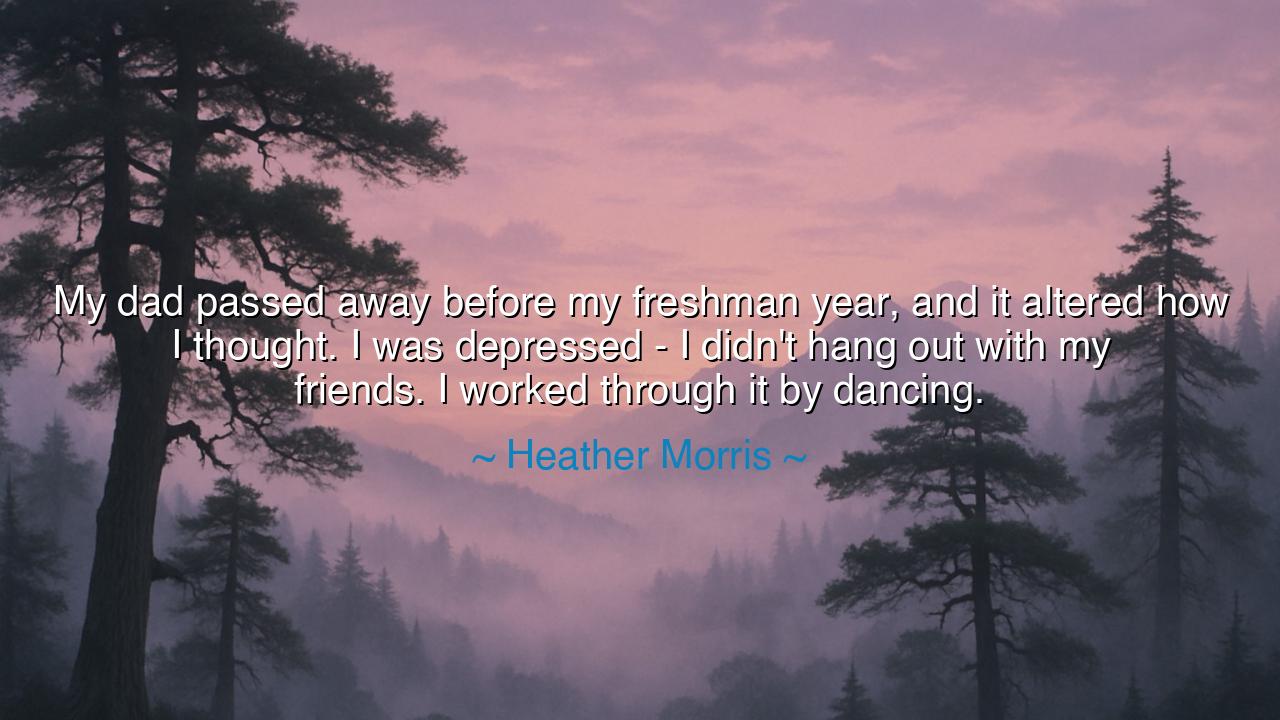
My dad passed away before my freshman year, and it altered how I
My dad passed away before my freshman year, and it altered how I thought. I was depressed - I didn't hang out with my friends. I worked through it by dancing.






“My dad passed away before my freshman year, and it altered how I thought. I was depressed — I didn't hang out with my friends. I worked through it by dancing.” Thus spoke Heather Morris, the actress and dancer whose words rise from the quiet valley of grief to the open plain of healing. Her confession is not merely a tale of sorrow, but a testament to the indomitable spirit of creation that lies within the human heart. Through her words, we glimpse a universal truth: that art can be both a refuge and a resurrection, a bridge between loss and life renewed.
In the ancient world, grief was seen not as a shadow to be feared, but as a sacred companion—a teacher sent by fate. The Greeks would say that sorrow is the forge of the soul, and that through its fire, a person is remade. So it was for Heather Morris, who found herself standing before the cold silence left by her father’s passing. Her world was altered, her laughter dimmed, her friendships distant. Yet in that stillness, something stirred—the rhythm of movement, the whisper of life pulsing through the body when words could not be spoken. In her dancing, she found a way not to escape her grief, but to speak it in another tongue.
Dance, to her, became prayer. Each motion, each turn, each leap was an offering to the memory of her father. The ancients understood such language well. When the Israelites crossed the Red Sea, Miriam danced in thanksgiving; when the Greeks celebrated Dionysus, they danced to honor the divine spirit of life itself. Movement has always been the soul’s oldest way of speaking—older than words, older than song. Heather’s dance, born of loss, became her way to reconnect with the eternal rhythm of existence. Through it, she found what many philosophers have sought: the transformation of pain into beauty, despair into expression, and mourning into meaning.
There is, in her story, the echo of another: Martha Graham, the mother of modern dance, who once said, “Great dancers are not great because of their technique; they are great because of their passion.” Graham herself endured loneliness, rejection, and the constraints of her time, yet she turned all her anguish into motion. Her art was a rebellion against silence, a declaration that even suffering can become sacred when it is shaped by movement. So too did Heather Morris dance her way through the dark, not toward forgetfulness, but toward understanding.
What this quote teaches, then, is that grief is not an end but a transformation. When something precious is taken from us, the heart is broken open, and in that breaking, new light can enter. To work through sorrow is to let it move—through tears, through words, through art, through the very body itself. For what is grief if not love that has nowhere to go? And what is art, if not love finding a new form? When Heather danced, she was letting her love for her father continue its journey—through movement, through time, through her own becoming.
Let this be the lesson to all who have known loss: do not bury your pain in silence, for it will fester there. Shape it. Move with it. Sing it. Paint it. Write it. Dance it. Whatever your art, let it become your bridge back to the living world. For every act of creation is also an act of healing. The ancients carved statues from marble not only to honor their gods but to release what their hearts could not hold within. In doing so, they taught us that creation is the purest form of remembrance.
And so, my friends, remember Heather’s truth: pain can be transformed into beauty. When life wounds you, let your spirit rise and move. Do not hide from the weight of your sorrow; let it teach you its rhythm. For there is a power that awakens only in those who have walked through darkness and found the courage to dance in its shadow. In that movement—in that living, breathing act of defiance—you will find not only healing, but the echo of eternity itself.






AAdministratorAdministrator
Welcome, honored guests. Please leave a comment, we will respond soon